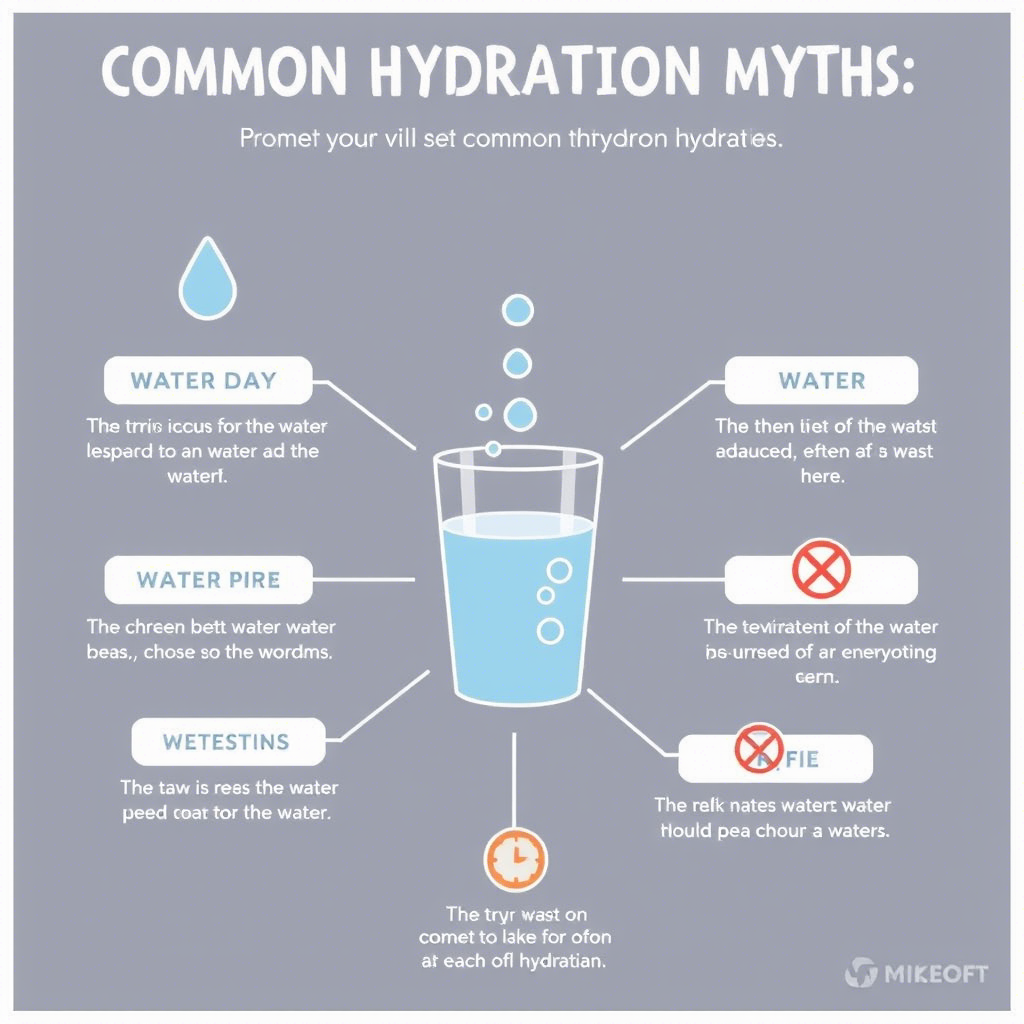Water is life—literally. Your body is 60% water, and every cell, organ, and tissue relies on it to function. Yet, in the age of wellness influencers and TikTok trends, hydration has become a battleground of conflicting advice. Should you drink 8 glasses a day? Is bottled water better than tap? Does coffee dehydrate you?
Read also: Gut health
The truth is, hydration myths are as pervasive as they are confusing. Some are harmless old wives’ tales; others can lead to serious health risks. This article cuts through the noise, separating fact from fiction with science-backed insights. Let’s dive into the murky waters of hydration myths and emerge with clarity.
Myth 1: “You Must Drink 8 Glasses of Water Daily”
The Truth: One Size Doesn’t Fit All
The “8×8 rule” (eight 8-ounce glasses daily) is a catchy slogan, not a scientific mandate. Your needs depend on:
- Activity Level: A marathon runner needs more than a desk worker.
- Climate: Hot, humid weather increases sweat loss.
- Diet: Water-rich foods (cucumbers, watermelon) count toward intake.
The National Academy of Medicine recommends 3.7 liters (men) and 2.7 liters (women) total fluids daily—including beverages and food.
Myth 2: “If You’re Thirsty, You’re Already Dehydrated”
The Truth: Thirst is a Reliable Early Warning System
Thirst kicks in when your body loses 1-2% of its water—a mild dehydration level. While chronic thirst could signal health issues (e.g., diabetes), occasional thirst is normal. Listen to your body—it’s smarter than viral infographics.
Myth 3: “Clear Urine Means You’re Hydrated”
The Truth: Pale Yellow is Perfect
Clear urine often means you’re overhydrated, diluting essential electrolytes like sodium. Aim for light lemonade-colored urine. Dark yellow or amber? Drink up.
Myth 4: “Sports Drinks Beat Water for Hydration”
The Truth: Save Them for Sweat Sessions
Sports drinks replace electrolytes lost through intense exercise (think 60+ minutes of sweating). For most daily activities, water suffices. Beware: A 20-ounce Gatorade packs 34g of sugar—equivalent to 8.5 teaspoons!
Myth 5: “Coffee Dehydrates You”
The Truth: Moderate Caffeine is Fine
While caffeine is a mild diuretic, studies show coffee in moderation (3-4 cups/day) doesn’t dehydrate. Your body adapts, and the water in coffee offsets fluid loss.
Myth 6: “Bottled Water is Healthier Than Tap”
The Truth: Tap Water is Regulated and Safe
In most developed countries, tap water undergoes stricter safety tests than bottled. Plus, bottled water’s plastic leaches microplastics. Invest in a reusable filter if taste is a concern.
Myth 7: “You Can’t Overhydrate”
The Truth: Hyponatremia is Real
Overhydration dilutes blood sodium, causing hyponatremia—a life-threatening condition. Symptoms include nausea, seizures, and confusion. Marathon runners and extreme dieters are most at risk.
Myth 8: “Drink Water Even If You’re Not Thirsty”
The Truth: Forced Hydration Stresses Kidneys
Chugging water without thirst overwhelms your kidneys, forcing them to work overtime. Hydrate based on activity and thirst cues—not arbitrary hourly reminders.
Myth 9: “Cold Water is Bad for Digestion”
The Truth: Temperature Doesn’t Matter
Your stomach warms fluids to body temperature within minutes. Cold water might even boost metabolism slightly by making your body work to heat it.
Myth 10: “All Fluids Hydrate Equally”
The Truth: Alcohol is a Dehydrator
Beer, wine, and cocktails inhibit antidiuretic hormone (ADH), making you pee more. For every alcoholic drink, have a glass of water to balance losses.
FAQs About Hydration
Q: How do I know if I’m dehydrated?
A: Signs include dry mouth, headache, fatigue, and infrequent dark urine. Pinch the skin on your hand—if it doesn’t snap back quickly, you might need fluids.
Q: Can I hydrate with tea or juice?
A: Yes! Herbal teas and 100% fruit juice count, but watch added sugars.
Q: Do electrolytes really matter?
A: Critical for nerve and muscle function. If sweating heavily, replenish with coconut water or electrolyte tablets.
Q: Are hydration apps accurate?
A: They’re estimates. Use them as guides, not gospel.
Conclusion
Hydration isn’t about hitting a magic number or following trends—it’s about balance. Your needs are as unique as your fingerprint, shaped by your lifestyle, environment, and biology. Ditch the myths, trust your thirst, and remember: Water is a tool for health, not a punishment or a competition.
Next time you reach for that giant gallon jug, ask yourself: Am I drinking this because I need it—or because Instagram said so? As the Greek philosopher Hippocrates wisely said, “Everything in excess is opposed to nature.” Stay hydrated, but stay sane.



Pingback: Posture Correction - Mental Health Stigma